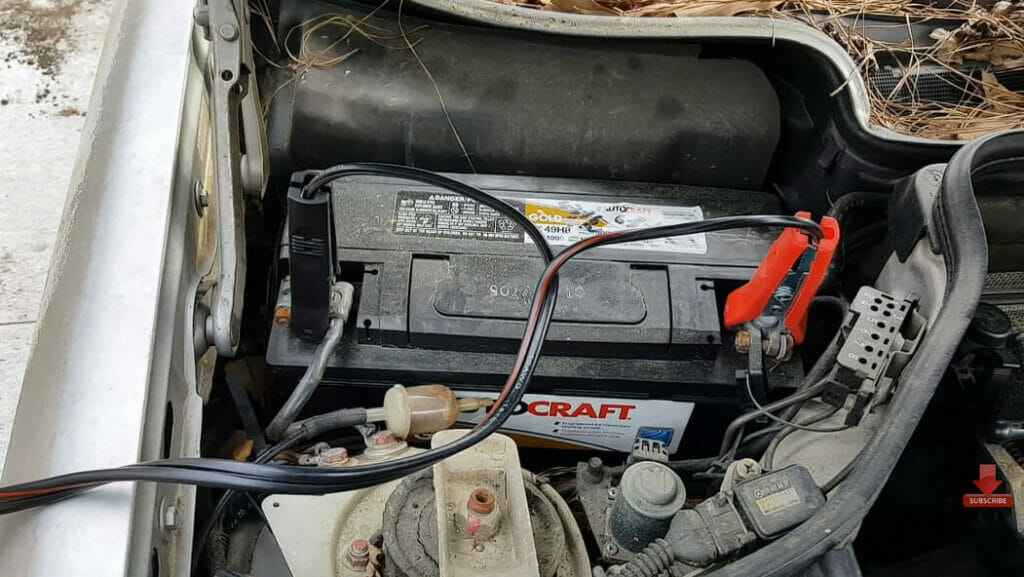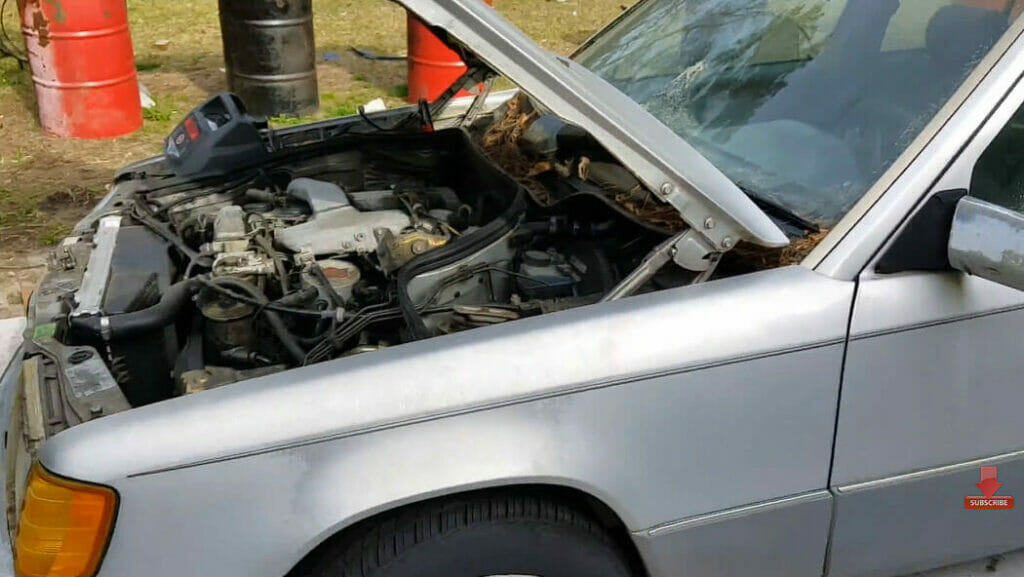What Does a Dead Battery Sound Like (Indicators, Symptoms, Solutions)

Have you ever turned the key in your car only to hear a groan or a slow churn before it eventually starts? Perhaps you’ve wondered what a nearly dead battery sounds like.
Key Takeaways – A clicking noise is the most common sound associated with a dying battery. This sound usually indicates that your battery is running low on power. Another sound you may hear from a dying battery is a slow cranking noise. This indicates your battery is struggling to provide enough power to start your engine. In some cases, you may not hear any sound at all from a nearly dead battery.
In this article, I’ll dive deeper and describe the noises your car may make when the battery is low on power, so you can identify the issue before it becomes a headache.
Recognizing the Sounds of a Failing Battery

As a car owner, paying attention to your car’s sounds is important, especially when diagnosing problems.
When it comes to a failing battery, there are several sounds you should be on the lookout for.
- Clicking or Ticking Sound: One of the most common sounds associated with a failing battery is a clicking or ticking noise when trying to start your car. This occurs when there isn’t enough power in the battery to turn over the engine. While a faulty starter motor or alternator can also cause this sound, it’s worth checking the battery first.
- Whirring Sound: Another sound you might hear when starting your car with a nearly dead battery is a whirring sound. This is due to the starter motor turning but not having enough battery power to engage the engine.
- Dimming Headlights: If you notice your headlights dimming or getting brighter when accelerating or decelerating, it’s a sign that the battery is starting to fail. It’s important to get your car checked as soon as possible and have the battery replaced if needed.
- Sputtering Engine: A failing battery can cause your engine to sputter or hesitate while driving due to a lack of power getting to the spark plugs. This can result in a jerky or sluggish driving experience.
- No Sound at All: If you turn the key and nothing happens, your battery is likely completely dead. In this case, you’ll need to jump-start your car or have it towed to a nearby repair shop.
That said, paying attention to your car’s sounds can help you diagnose a failing battery before it dies.
Misconceptions About Car Battery Sounds
| Misconceptions | Truth |
|---|---|
| A clicking sound always means a dead battery | While a clicking sound is often associated with a weak battery, it can also be caused by a faulty starter motor or alternator. |
| If my car doesn’t make any sound, the battery must be fine | The silence when you turn the key can indicate a completely dead battery, unable to power the starter motor. |
| A whirring sound means my engine is starting | A whirring sound can indicate that the starter motor is turning, but there isn’t enough battery power to engage the engine. |
No Sound from the Starter Motor

One of the most common symptoms of a nearly dead battery is the lack of response from the starter motor.
When you turn the key, you won’t hear anything from the engine, no revving, no cranking, nothing. This can be frustrating, but it’s not always a sign of a major problem.
You might not hear anything from the starter motor when you turn the key for several reasons, and it’s important to know what might be causing the issue.
Battery Problem
If the battery dies, it won’t have enough power to turn the starter motor.
You can check the battery with a multimeter to see if it’s the issue. A reading between 12.4 and 12.7 volts typically indicates a fully charged battery.
If your battery is below 12.2 volts, it’s considered dead and needs to be recharged or replaced.
Loose Connection
Check the battery and starter motor connections for corrosion or a loose connection.
Clean the terminals with a wire brush and replace any damaged wire connectors if you notice any corrosion or looseness.
If that does not help, check for loose or broken wiring, damaged fuses, or worn-out ignition switches.
Bad Starter Motor
If the battery and connections are fine, but the starter motor still doesn’t work, it could be a sign of a bad starter motor.
Over time, starter motors can wear down and eventually fail, leaving you with a car that won’t start. In such cases, you might need to replace the starter motor.
Common Questions and Answers About Car Battery Sounds
| Questions | Answers |
|---|---|
| What does a clicking sound mean when I try to start my car? | A clicking sound often indicates a weak or dead battery. It’s a result of the starter motor not receiving enough power to turn the engine over. |
| Why is my car making a whirring sound? | A whirring sound could be due to the starter motor turning but not having enough power to engage the engine. This often points to a weak battery. |
| What does it mean if there’s no sound when I try to start my car? | If you turn the key and hear no sound at all, it’s possible that your battery is completely dead and unable to power the starter motor. |
| Why do I hear a sputtering sound while driving? | A sputtering sound could be due to a lack of power reaching the spark plugs, often caused by a failing battery. |
| Can a bad battery cause engine noises? | Yes, a failing battery can lead to various engine noises due to insufficient power to operate the vehicle’s components correctly. |
What to Do When You Hear Strange Sounds from Your Battery

If you hear strange sounds from your battery, it’s time to act. Here’s what you need to do:
- Check your Battery: The first thing you need to do is to check your battery. Look for any signs of corrosion on your battery’s terminals. Corrosion can cause various issues, including strange noises.
- Tighten Connections: If there is no visible corrosion, check the connections on your battery’s terminals. Loose connections can also cause odd noises. Make sure they are tight and secure.
- Charge your Battery: If the battery has not been charged for a long time, it may be losing its charge, and this could be causing unusual sounds. Charge your battery for several hours to see if this corrects the problem.
- Replace the Battery: If you’ve tried the above steps and still have weird noises, it may be time to replace it. Visit an auto shop and ask them to check the battery’s voltage levels. If they’re low, your battery is likely dead, and it’s time to get a new one.
As such, hearing strange noises from your car battery is not uncommon. You should not ignore these sounds and take prompt action to avoid further issues.
If you’re unsure about what to do, consult a professional mechanic. Proactively caring for your battery can avoid costly repairs and unpredictable car troubles.
Replacing a Dead Car Battery

If your car battery is completely dead, you must replace it. Here are the steps you can follow to replace a dead car battery:
- First, you need to identify the location of the battery and ensure that the car engine is turned off.
- Remove any plastic covers or clamps holding the battery in place.
- Using a wrench or socket set, loosen the nut or bolt that holds the negative (black) cable to the negative terminal on the battery. Then, disconnect the negative cable from the battery.
- Repeat step 3 with the positive (red) cable on the battery’s positive terminal.
- Carefully lift the battery out of its compartment using both hands. Avoid tipping it to the side or upside down, as this can cause battery liquid to spill out.
- Clean the battery terminals and surrounding area, removing dirt or corrosion with a wire brush or rag.
- Install the new battery, connecting the positive cable to the positive terminal and the negative cable to the negative terminal.
- Tighten the nuts or bolts that secure the cables to the battery terminals, ensuring they are tight enough to prevent them from coming loose but not so tight that they strip the threads.
- Replace any clamps or covers that were removed in Step 2.
- Turn the car engine on and make sure the battery is charging properly.
Replacing a car battery is a fairly straightforward process that most people can do independently.
However, if you do not feel confident doing this, it is always better to seek the help of a professional mechanic. They can ensure your battery is installed correctly and your car runs smoothly.
References
Organizations:
- American Automobile Association (AAA). https://www.ace.aaa.com/
- Automotive Service Excellence (ASE). https://www.ase.com/
Books:
- “Auto Repair for Dummies” by Deanna Sclar
- “How to Repair Your Car” by Paul Brand
Websites:
- Edmunds. https://www.edmunds.com/
- AutoMD. https://www.automd.com/
- YourMechanic. https://www.yourmechanic.com/
Video References
Drews Quick Fixes Ideas And Hack
Robert DIY
